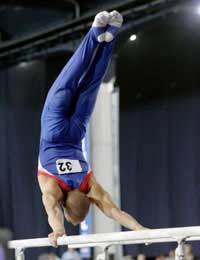Disciplines of Olympic Gymnastics

Gymnastics is one of the defining sports of the Olympics and has been present at every Games. The sport can be traced back to ancient Greece and similar disciplines were practised in ancient Rome, China, India and Persia, the aim being to prepare young men for battle. In those days the dress requirements for athletes were minimal and the word gymnastics is derived from the Greek word gymnos, meaning naked.
Three disciplines make up the modern Olympic gymnastic programme - artistic, rhythmic and trampoline - offering 18 gold medals between them. The most prestigious and best known of these is artistic gymnastics, performed on an apparatus. It boasts 14 events: the men's floor exercises, horizontal bar, vault, parallel bars, pommel horse, rings, individual all-round and team competition, and the women's balance beam, floor exercises, uneven bars, vault, individual all-round and team competition.
The early Games featured some unusual events, such as rope climbing, tumbling and club swinging, but the Olympic programme began to settle in 1924 and four years later in Amsterdam women began competing at the Games. Nowadays gymnasts require strength, agility, style and grace, and consistently provide many of the most astounding Olympic spectacles.
Korbut Shines
Soviet Olga Korbut produced some of the most memorable displays in 1972 at Munich, where she won gold in the balance beam, floor exercises and women's team competition and silver in the uneven bars. But even Korbut was upstaged four years later in Montreal, despite winning silver in the balance beam and another gold in the women's team competition. Romanian Nadia Comaneci stole the show, winning the individual all-round, uneven bars and balance beam titles, adding silver in the team competition and bronze in the floor exercises.Even more remarkable than Comaneci's medal haul was the fact the she became the first gymnast in Olympic history to be awarded the perfect score of 10.0. It came on the uneven bars and the judges went on to award her the maximum mark seven times during the Games.
Four years later, in Moscow, Soviet Aleksandr Dityatin became the first male gymnast to achieve a perfect 10. It came in the vault as Dityatin won an incredible eight medals in one Olympic Games, including gold in the individual all-round, rings and team competition.
Golden Rhythm
Rhythmic gymnastics is performed with an apparatus and accompanied by music. The gymnasts, all women, perform on a 13-metre-square floor with rope, hoop, ball, clubs and ribbon. There are two events: the individual all-round and a team competition. In the individual event, gymnasts perform routines with four of the five apparatus. In the team competition, teams of five perform together, once using clubs and once with three using ribbons and two using hoops.Rhythmic gymnastics incorporates many positions and leaps derived from classical ballet, including pliés, jetés, attitudes and arabesques. It was recognised as an official discipline by the Fédération Internationale de Gymnastique (FIG) in 1962 and the individual all-around competition was introduced into the Games in 1984, with the team competition added 12 years later in Atlanta.
Trampoline gymnastics made its debut at the Sydney Games in 2000, featuring both men's and women's individual events. Russians, in the form of Alexander Moskalenko and Irina Karavaeva, took both gold medals.








